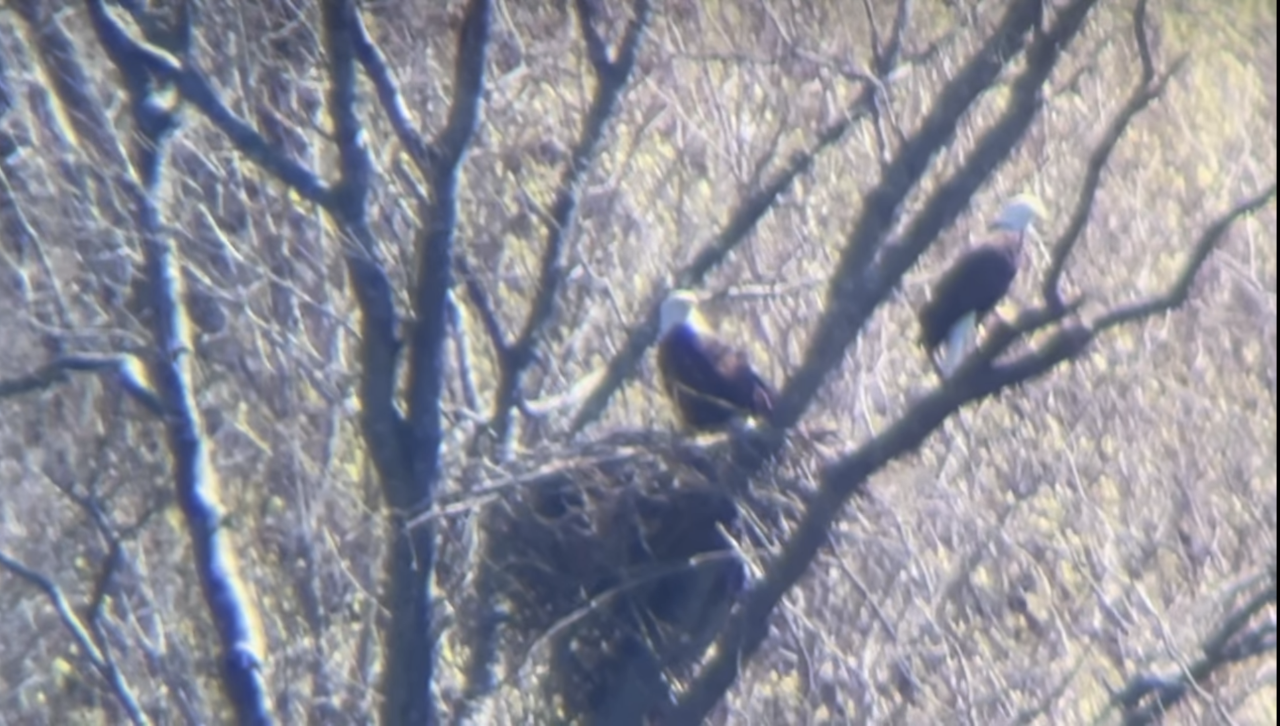
Baby eaglets just hatched at Radnor Lake.
The long wait is over. On day double chai-36 days after their eggs were laid- at least two eaglets have hatched. My two young charges, L and M, were with me two days before, and as we were heading to the aviary, we found Ranger Steve Ward on a trail above and parallel to Otter Creek Road with his high-powered telescope set up. He patiently adjusted it for the boys and seconds later L exclaimed, “Wow, you can see its eyes!” Steve predicted that the babies would hatch in 24 hours, and he was right. Spend even just a little time with him and you get an appreciation for his dedication to and respect for the birds under his watch in the wild and in the aviary.
“This is the conservation story of our lifetime,” Ward told WKRN in 2022. “American bald eagles were endangered species until 2007. And here we are 15 years later, and you got one nesting less than eight miles from the Capitol of Tennessee.” There are signs all over reminding us how seriously bald eagle protection is taken with possible imprisonment or fines up to $250,000. And since new nests have a 50 percent mortality rate the rangers were not taking any chances. They did not set up a nest cam which could have caused the parents to abandon the nest, and last spring two eaglets hatched, one of which is still inhabiting Radnor Lake State Park.
Though these days, the Tennessee legislature is in the news for its controversial, divisive laws, last year the “Leg” was roused to pass a joint resolution welcoming the eaglets, wishing them the best in their fledging efforts, and thanking Ranger Steve and his staff for what they have done to make this “miracle” available for public viewing. I’m not sure that it is a “nes,” but it is a nest “gadol,” about five feet in diameter and over a couple of feet tall.
Another avid bird watcher with a telephoto lens told the boys that after the eaglets were born, we would be able to see a lot more fishing by the parents as last year’s eaglets enjoyed large-mouth bass among other Radnor delicacies. High on a hill, three-quarters of a mile up a paved road, at the Barbara J. Mapp Aviary a dead fish sat in a pool of water in the vulture enclosure. Like the other six birds housed there, the vulture had been injured in the wild, unable to fly because it had been shot. The others-three bald eagles, a golden eagle, a great horned owl, and a red-tailed hawk had been hit by cars or shot. On the day we visited, access to the golden eagle had been blocked as she had laid eggs and was very protective even though they were not viable. I told L and M to ask their parents about that. One can get quite close to the enclosures which is a great privilege. Because the birds are sensitive, visits are limited to six hours a week.
Inside the education center are tanks of turtles and snakes, and the boys were given the opportunity to hold a corn snake and a six-foot rat snake. One of the boys remarked how strong their muscles must be for them to hold their heads up. Shout out to the women dressed in ranger green who, when asked by a concerned mom if the middle cage was supposed to be open, expressed shock and replied, “Oh, no!” She then followed up saying, “Just kidding, I don’t work here.” Fear not, there are no snakes in that exhibit. The rangers take their work seriously, and just to be permitted to have the birds Steve had to spend six hundred hours with someone already trained to do so.
In Deuteronomy 32:11 Moses says, “He was like an eagle arousing its nest, hovering over its young.”
However, some scholars suggest that it was a reference to vultures. Ranger Steve thinks that the vulture is one of the most misunderstood birds of prey. We see them hovering around dead animals, perched ominously in movies, yet they are vital to ecosystems as their disposal of carrion prevents the spread of bacteria and disease. The Torah presents it as loving and caring, and the long devotion of the vulture to its young symbolizes God’s dedication to us.
Down at the lake the devoted eagle parents will spend the next ninety days feeding their young until they are able to fledge and hunt for themselves. In about a week or so we should be able to see the little ones popping their heads up waiting for their parents to pass over them with meals. See you out there!

0Comments
Add CommentPlease login to leave a comment